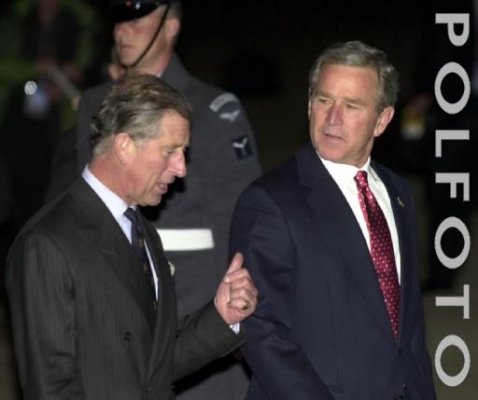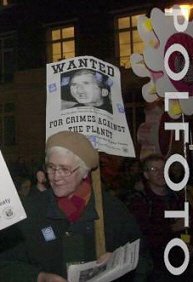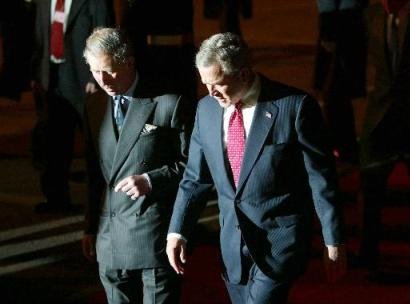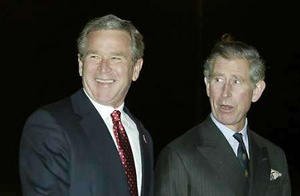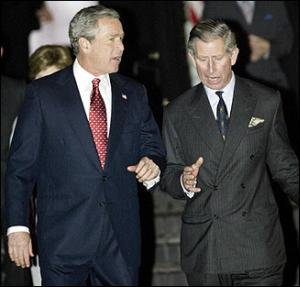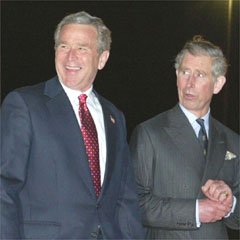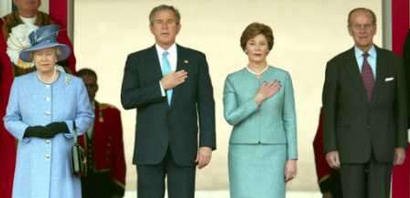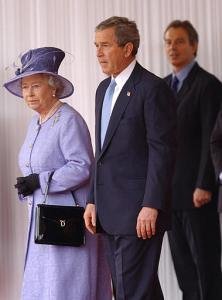You are using an out of date browser. It may not display this or other websites correctly.
You should upgrade or use an alternative browser.
You should upgrade or use an alternative browser.
State Visit from the President of the United States: November 18-21, 2003
- Thread starter Josefine
- Start date
If you have answers, please help by responding to the unanswered posts.
- Status
- Not open for further replies.
The "guy" is the U.S. Ambassador to the Court of St. James, the Hon. William S. Farish. I think he is just introducing the President to the PoW, but he MAY be acting as interpreter also!Originally posted by King Christian@Nov 18th, 2003 - 3:59 pm
WHo's the guy (with the light blue tie) between PoW and the Prez .... the interpreter ?
U.S. President George W. Bush (news - web sites), right, walks with Britain's Prince Charles during the arrival ceremony at Heathrow Airport in London Tuesday, Nov. 18, 2003 . Bush is joining with America's staunchest ally in the war in Iraq for a state visit that promises contrasting pictures of elegant ceremonies at Buckingham Palace and noisy street protests by thousands of anti-war demonstrators. (AP Photo/Pablo Martinez Monsivais)
Attachments
President George W. Bush (L) laughs with Britain's Prince Charles as he arrives at London's Heathrow Airport for his official state visit to the UK, November 18, 2003. Bush, facing large protests in London over the war in Iraq, will tell the British people that there are times when the use of military force is necessary, a senior U.S. official said. Photo by Jason Reed/Reuters
Attachments
Alexandria
Heir Apparent
- Joined
- Jan 14, 2003
- Messages
- 3,207
- Country
- Canada
Charles looks like he's thinking: "This man has more power than me?! How can that be?!"Originally posted by Binny@Nov 18th, 2003 - 5:24 pm
US President George W. Bush (L) walks with Prince Charles ® upon arriving at Heathrow Airport in London, England(AFP/Tim Sloan)
Don't you love some of the expressions on Prince Charles face?! Wonder what George is saying?!
I wonder what Charles thinks of Bush? Didn't I read that Charles made some comments about Bush not being the brightest and hard on Bush for the war in Iraq?
And I wonder if Bush is thinking of trying to set one of his daughters up with Wills? Wouldn't the royal family love that match!
Some of the photos are almost like the ones in competitions where you have to think of captions...
Charles - "How was your flight"?
George - "Well, the food was better than it is on British Airways"..
George - "Will your Mom have room for us"?
Charles - "Yes, but you may have to share a bed with a couple of corgis and a few protesters "..

Charles - "How was your flight"?
George - "Well, the food was better than it is on British Airways"..
George - "Will your Mom have room for us"?
Charles - "Yes, but you may have to share a bed with a couple of corgis and a few protesters "..
Alexandria
Heir Apparent
- Joined
- Jan 14, 2003
- Messages
- 3,207
- Country
- Canada
I vote for this one!Originally posted by Binny@Nov 18th, 2003 - 6:56 pm
George - "Will your Mom have room for us"?
Charles - "Yes, but you may have to share a bed with a couple of corgis and a few protesters "
Dennism
Majesty
- Joined
- Aug 29, 2003
- Messages
- 6,408
- City
- East of the sun and west of the moon
- Country
- United States
"Love, pondered British heart-throb Hugh Grant, is "loving someone no matter what their faults in a blind and unconditional way, such as the love Tony Blair has for George Bush."
"That is the purest form of British love today," he added, on the same day that the US president was to begin his historic visit to Britain.
Their Love Duet
"That is the purest form of British love today," he added, on the same day that the US president was to begin his historic visit to Britain.
Their Love Duet
This is the timetable of events that will be undertaken by the President and First Lady during their state visit to Great Britain. Nov.18-21, 2003
During the visit, the Pres. and the First Lady will be staying in the magnificent Belgian Suite at Buckingham Palace
Today- Nov. 18, 2003
The Bushes land at Heathrow this evening and receive a private welcome from the Prince of Wales.
Tomorrow- Nov. 19, 2003
At 9am President Bush receives a ceremonial welcome at Buckingham Palace, followed by viewing of the Royal Collection.
He then meets Michael Howard, the Conservative leader, and Charles Kennedy, the Liberal Democrat leader.
At lunchtime, he makes a speech at the Banqueting House in Whitehall on the Transatlantic Alliance.
In the afternoon he visits the memorial to British victims of September 11, Grosvenor Square, and meets relatives.
In the evening the president and the First Lady are guests of honour at a state banquet at Buckingham Palace.
Thursday- Nov. 20, 2003
At 9am the president lays a wreath at the Tomb of the Unknown Warrior and tours Westminster Abbey. He meets British servicemen and women who fought in Afghanistan and Iraq and may meet bereaved relatives.
Mr Bush has talks with Tony Blair at No 10 before hosting a joint press conference with the Prime Minister at the Foreign Office.
The two leaders have lunch at No 10, with the menu chosen and prepared under the supervision of Nigella Lawson, the television cook.
Miss Lawson supervises the menu for a separate lunch for Laura Bush and Cherie Blair after they have seen children perform extracts from Shakespeare.
After lunch, the Prime Minister and the president have discussions on HIV/Aids with representatives from relevant countries and charities.
In the evening, Mr and Mrs Bush host a reciprocal dinner for the Queen.
Friday- Nov. 21, 2003
At 9.30am the president and the First Lady are given a formal farewell by the Queen and Prince Philip to mark the end of their official state visit.
They visit Mr Blair's constituency of Sedgefield, Co Durham, and the Blairs' four-bedroom Victorian house in Trimdon, a former mining village.
The president has lunch with the Prime Minister and a group of his constituents in Sedgefield before flying home.
During the visit, the Pres. and the First Lady will be staying in the magnificent Belgian Suite at Buckingham Palace
Today- Nov. 18, 2003
The Bushes land at Heathrow this evening and receive a private welcome from the Prince of Wales.
Tomorrow- Nov. 19, 2003
At 9am President Bush receives a ceremonial welcome at Buckingham Palace, followed by viewing of the Royal Collection.
He then meets Michael Howard, the Conservative leader, and Charles Kennedy, the Liberal Democrat leader.
At lunchtime, he makes a speech at the Banqueting House in Whitehall on the Transatlantic Alliance.
In the afternoon he visits the memorial to British victims of September 11, Grosvenor Square, and meets relatives.
In the evening the president and the First Lady are guests of honour at a state banquet at Buckingham Palace.
Thursday- Nov. 20, 2003
At 9am the president lays a wreath at the Tomb of the Unknown Warrior and tours Westminster Abbey. He meets British servicemen and women who fought in Afghanistan and Iraq and may meet bereaved relatives.
Mr Bush has talks with Tony Blair at No 10 before hosting a joint press conference with the Prime Minister at the Foreign Office.
The two leaders have lunch at No 10, with the menu chosen and prepared under the supervision of Nigella Lawson, the television cook.
Miss Lawson supervises the menu for a separate lunch for Laura Bush and Cherie Blair after they have seen children perform extracts from Shakespeare.
After lunch, the Prime Minister and the president have discussions on HIV/Aids with representatives from relevant countries and charities.
In the evening, Mr and Mrs Bush host a reciprocal dinner for the Queen.
Friday- Nov. 21, 2003
At 9.30am the president and the First Lady are given a formal farewell by the Queen and Prince Philip to mark the end of their official state visit.
They visit Mr Blair's constituency of Sedgefield, Co Durham, and the Blairs' four-bedroom Victorian house in Trimdon, a former mining village.
The president has lunch with the Prime Minister and a group of his constituents in Sedgefield before flying home.
barbara_41172
Gentry
- Joined
- Sep 19, 2003
- Messages
- 67
There's been a lot of talk about George, but what about Mrs Bush? Personally I like her very much. She's intelligent and graceful, never getting herself in a muddle like her poor hubby. Her clothes are on the elegant side too 
TC
Barbara
TC
Barbara
From The New York Daily News -
LONDON - The first time George W. Bush met Queen Elizabeth, he told her his cowboy boots were embroidered with "God save the queen."
Bush - who was attending a 1991 state dinner for the queen and her husband, Prince Philip, when his father was President - then added that he was the black sheep of his family.
"Who's yours?" he asked her.
"None of your business," she replied with a smile.
That royal faux pas, though, is water under the Tower Bridge. When the President and First Lady Laura Bush arrive in London tomorrow, they will stay at the one place in Britain where they can be sure of a cordial welcome: Buckingham Palace, the queen's London home.
"Buckingham Palace has got a tremendous mystique to it. And so Laura and I are really looking forward to coming," Bush told BBC-TV yesterday.
Bush is the first U.S. President to come to Britain on a state visit - meaning he was invited by the monarch, not the government.
The Bushes will be greeted by Prince Charles when they arrive tomorrow night and then will officially be welcomed by the queen amid much pageantry in the palace forecourt on Wednesday morning.
The President will be the guest of honor at a white-tie banquet Wednesday evening. Bush said he had to rent his tail coat for the occasion.
The state dinner is a glittering event that will follow a rigid protocol. The 160 guests will include about 30 royal relatives.
Invitees are almost certain to include Prime Minister Tony Blair and his wife, Cherie; the archbishop of Canterbury; captains of industry, and a sprinkling of knights and dames from the world of the arts.
Originally published on November 17, 2003
LONDON - The first time George W. Bush met Queen Elizabeth, he told her his cowboy boots were embroidered with "God save the queen."
Bush - who was attending a 1991 state dinner for the queen and her husband, Prince Philip, when his father was President - then added that he was the black sheep of his family.
"Who's yours?" he asked her.
"None of your business," she replied with a smile.
That royal faux pas, though, is water under the Tower Bridge. When the President and First Lady Laura Bush arrive in London tomorrow, they will stay at the one place in Britain where they can be sure of a cordial welcome: Buckingham Palace, the queen's London home.
"Buckingham Palace has got a tremendous mystique to it. And so Laura and I are really looking forward to coming," Bush told BBC-TV yesterday.
Bush is the first U.S. President to come to Britain on a state visit - meaning he was invited by the monarch, not the government.
The Bushes will be greeted by Prince Charles when they arrive tomorrow night and then will officially be welcomed by the queen amid much pageantry in the palace forecourt on Wednesday morning.
The President will be the guest of honor at a white-tie banquet Wednesday evening. Bush said he had to rent his tail coat for the occasion.
The state dinner is a glittering event that will follow a rigid protocol. The 160 guests will include about 30 royal relatives.
Invitees are almost certain to include Prime Minister Tony Blair and his wife, Cherie; the archbishop of Canterbury; captains of industry, and a sprinkling of knights and dames from the world of the arts.
Originally published on November 17, 2003
That's probably going to become a classic quote, Dennism!Originally posted by Dennism@Nov 18th, 2003 - 7:36 pm
"Love, pondered British heart-throb Hugh Grant, is "loving someone no matter what their faults in a blind and unconditional way, such as the love Tony Blair has for George Bush."
"That is the purest form of British love today," he added, on the same day that the US president was to begin his historic visit to Britain.
P
Pictures_of_Lily
Guest
 Oh my! That wanker dropping poor defenseless Barney! How horrible! I am so appalled!
Oh my! That wanker dropping poor defenseless Barney! How horrible! I am so appalled!U.S. President George W. Bush (2L) and his wife Laura (2R) stand for the playing of the U.S. national anthem with Britain's Queen Elizabeth (L) and Prince Philip ® during the ceremonial welcome on the first day of the president's state visit to the UK, November 19, 2003. Bush will mount a staunch defense of U.S. military might on Wednesday as opponents of the Iraq war protest against the president's historic visit to top ally Britain. Photo by Stephen Hird/Reuters
Attachments
U.S. President George W. Bush, center, is welcomed by Britain's Queen Elizabeth II and Britain's Prime Minister Tony Blair right, Wednesday, Nov. 19, 2003, amid tight security at London's, Buckingham Palace. Traditional British pomp and ceremony, including a 41-gun salute, was laid on for start of the State visit. (AP Photo/Kirsty Wigglesworth/WPA pool)
Attachments
Alexandria
Heir Apparent
- Joined
- Jan 14, 2003
- Messages
- 3,207
- Country
- Canada
www.yahoo.com
Bush Defends Iraq War in Britain Visit
By SCOTT LINDLAW, Associated Press Writer
LONDON - Welcomed to Britain with royal pageantry and a smattering of anti-war protesters, President Bush on Wednesday defended the war in Iraq, saying military might must at times be used to confront the continuing, global danger of terrorism.
"In some cases, the measured use of force is all that protects us from a chaotic world ruled by force," Bush told academics gathered at Whitehall Palace.
During a 3 1/2-day state visit here, Bush was seeking to puncture what he views as misconceptions on this side of the Atlantic about America's use of force in Iraq.
"There are principled objections to the use of force in every generation and I credit the motives behind these views," Bush said, mindful of the bitter opposition among many in Britain and across Europe to the U.S.- and British-led war in Iraq.
But, he added: "Those in authority are not judged only by good motivations. That duty sometimes requires the violent restraint of violent men."
He invoked the Sept. 11, 2001, terrorist attacks in America to warn against inaction.
"The hope that danger has passed is comforting, is understanding, and it is false," he said. "These terrorists target the innocent and they killed by the thousands and they would, if they gain the weapons they seek, kill by the millions and not be finished. ... The evil is in plain sight. The danger only increases with denial."
Earlier, Queen Elizabeth II (news - web sites) and Prince Philip gave a royal salute to the American leader, greeting Bush at Buckingham Palace.
As ceremonial cannon blasts from a 41-gun salute shook the palace, Bush and his wife, Laura, moved down a receiving line with the queen and prince, greeting Prime Minister Tony Blair (news - web sites), Foreign Secretary Jack Straw and a phalanx of military officers in formal dress. Bush and the prince then inspected a column of Coldstream Guards, with their trademark gray coats and tall, furry black hats.
Buckingham Palace, the queen's London residence, also was a focal point for demonstrators bitterly opposed to the Iraq war. They gathered behind metal barriers Wednesday, watched by large numbers of yellow-jacketed police officers.
But though the light crowd of protesters was kept several dozen yards from the gates, their chants could be heard inside the grounds as the president greeted dignitaries.
In his speech, Bush subtly invoked Europe's history of appeasement of dictators, reminding his audience of the critical work the Allies did to set postwar Germany on the path to democracy — and thanking the British for their help in setting Iraq on a different course now.
"Let us never forget how Europe's unity was achieved," he said. "Together our nations are standing and sacrificing ... in a distant land at this very hour."
With as many as 100,000 people preparing to march through London Thursday to protest the Iraq war and occupation, Bush acknowledged "good-faith disagreements in your country and mine over the course and timing of military action in Iraq."
But he warned against breaking the coalition's commitment to see Iraq through to a stable democracy.
"The failure of democracy in Iraq would throw its people back into misery and turn that country over to terrorists who wish to destroy us," he said. "Yet democracy will succeed in Iraq because our will is firm, our word is good and the Iraqi people will not surrender their freedom."
Blair, who has faced strong criticism from the British public for remaining America's staunchest ally in the Iraq war, also defended Britain's close relationship with the United States and the coalition's handling of the situation in Iraq.
"It really is about time we started to realize who are allies are, who our enemies are, stick with the one and fight the other," Blair told the House of Commons, to loud cheers.
In a friendly jab at France, Bush noted how a 14-point plan for peace that President Woodrow Wilson took to Britain in 1918 was met with skepticism by the prime minister of France, who complained then that even God himself "only had 10 commandments."
"Sounds familiar," he said, referring to Prime Minister Jacques Chirac's staunch opposition of the U.S.-led war in Iraq.
Bush also called for countries across the globe, particularly in the Middle East, to embrace democracy.
"Our great democracies should oppose tyranny whenever it is found," he said.
On the first full day of his visit in England, Bush was hoping to sway people here like Nina Baker, a Scottish Green Party activist from Glasgow.
"Everything about (Bush) is just deeply depressing," she said Wednesday outside Buckingham Palace. "Bush stole the presidency, Blair lied to the people, Bush led us down the path of war. They are not listening to the public."
Bush was reaching out to a second audience as well, by granting an interview to the London-based Al-Sharq Al-Awsat newspaper, which has an Arab readership. Also Wednesday, he was meeting with relatives of Britons lost in the Sept. 11 attacks.
Thursday, Bush was to sit down with family members of British soldiers killed in Iraq.
Bush Defends Iraq War in Britain Visit
By SCOTT LINDLAW, Associated Press Writer
LONDON - Welcomed to Britain with royal pageantry and a smattering of anti-war protesters, President Bush on Wednesday defended the war in Iraq, saying military might must at times be used to confront the continuing, global danger of terrorism.
"In some cases, the measured use of force is all that protects us from a chaotic world ruled by force," Bush told academics gathered at Whitehall Palace.
During a 3 1/2-day state visit here, Bush was seeking to puncture what he views as misconceptions on this side of the Atlantic about America's use of force in Iraq.
"There are principled objections to the use of force in every generation and I credit the motives behind these views," Bush said, mindful of the bitter opposition among many in Britain and across Europe to the U.S.- and British-led war in Iraq.
But, he added: "Those in authority are not judged only by good motivations. That duty sometimes requires the violent restraint of violent men."
He invoked the Sept. 11, 2001, terrorist attacks in America to warn against inaction.
"The hope that danger has passed is comforting, is understanding, and it is false," he said. "These terrorists target the innocent and they killed by the thousands and they would, if they gain the weapons they seek, kill by the millions and not be finished. ... The evil is in plain sight. The danger only increases with denial."
Earlier, Queen Elizabeth II (news - web sites) and Prince Philip gave a royal salute to the American leader, greeting Bush at Buckingham Palace.
As ceremonial cannon blasts from a 41-gun salute shook the palace, Bush and his wife, Laura, moved down a receiving line with the queen and prince, greeting Prime Minister Tony Blair (news - web sites), Foreign Secretary Jack Straw and a phalanx of military officers in formal dress. Bush and the prince then inspected a column of Coldstream Guards, with their trademark gray coats and tall, furry black hats.
Buckingham Palace, the queen's London residence, also was a focal point for demonstrators bitterly opposed to the Iraq war. They gathered behind metal barriers Wednesday, watched by large numbers of yellow-jacketed police officers.
But though the light crowd of protesters was kept several dozen yards from the gates, their chants could be heard inside the grounds as the president greeted dignitaries.
In his speech, Bush subtly invoked Europe's history of appeasement of dictators, reminding his audience of the critical work the Allies did to set postwar Germany on the path to democracy — and thanking the British for their help in setting Iraq on a different course now.
"Let us never forget how Europe's unity was achieved," he said. "Together our nations are standing and sacrificing ... in a distant land at this very hour."
With as many as 100,000 people preparing to march through London Thursday to protest the Iraq war and occupation, Bush acknowledged "good-faith disagreements in your country and mine over the course and timing of military action in Iraq."
But he warned against breaking the coalition's commitment to see Iraq through to a stable democracy.
"The failure of democracy in Iraq would throw its people back into misery and turn that country over to terrorists who wish to destroy us," he said. "Yet democracy will succeed in Iraq because our will is firm, our word is good and the Iraqi people will not surrender their freedom."
Blair, who has faced strong criticism from the British public for remaining America's staunchest ally in the Iraq war, also defended Britain's close relationship with the United States and the coalition's handling of the situation in Iraq.
"It really is about time we started to realize who are allies are, who our enemies are, stick with the one and fight the other," Blair told the House of Commons, to loud cheers.
In a friendly jab at France, Bush noted how a 14-point plan for peace that President Woodrow Wilson took to Britain in 1918 was met with skepticism by the prime minister of France, who complained then that even God himself "only had 10 commandments."
"Sounds familiar," he said, referring to Prime Minister Jacques Chirac's staunch opposition of the U.S.-led war in Iraq.
Bush also called for countries across the globe, particularly in the Middle East, to embrace democracy.
"Our great democracies should oppose tyranny whenever it is found," he said.
On the first full day of his visit in England, Bush was hoping to sway people here like Nina Baker, a Scottish Green Party activist from Glasgow.
"Everything about (Bush) is just deeply depressing," she said Wednesday outside Buckingham Palace. "Bush stole the presidency, Blair lied to the people, Bush led us down the path of war. They are not listening to the public."
Bush was reaching out to a second audience as well, by granting an interview to the London-based Al-Sharq Al-Awsat newspaper, which has an Arab readership. Also Wednesday, he was meeting with relatives of Britons lost in the Sept. 11 attacks.
Thursday, Bush was to sit down with family members of British soldiers killed in Iraq.
- Status
- Not open for further replies.
Similar threads
- Replies
- 4
- Views
- 531
- Replies
- 0
- Views
- 345
- Replies
- 55
- Views
- 8K
- Replies
- 1
- Views
- 200
- Replies
- 49
- Views
- 5K
Latest posts
-
-
Tiaras and Jewels for the Next Generation, Part 2
- Latest: duke of poliganc
-
-


